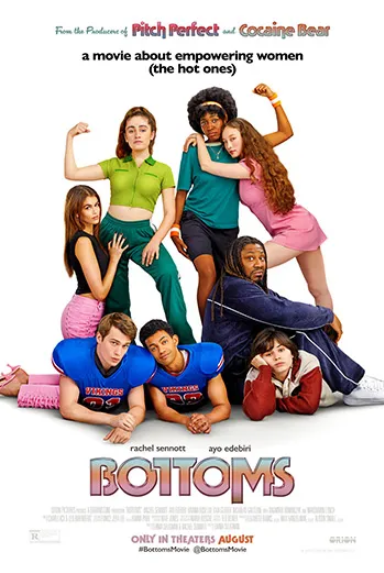Freddie deBoer — whose new book just got published — considers the way a new movie is being marketed, as if anything to do with LGBT issues is somehow still “daring” or “risky” or “challenging” to American audiences in the 2020s:
Consider this New York magazine cover story on the new film Bottoms, about a couple of lesbian teenagers (played by 28-year-olds) who start a high school fight club in order to try and get laid. I’m interested in the movie; it looks funny and I’ll watch it with an open mind. Movies that are both within and critiques of the high school movie genre tend to be favorites of mine. But the preemptive hype about it — which of course the creators can’t directly control — has been fundamentally false, fundamentally dishonest about what constitutes artistic risk and personal risk in 2023. The underlying premise of the advance discussion has been that making a high school movie about a lesbian fight club, today, is inherently subversive and very risky. And the thing is … that’s not true. At all. In fact, when I first read the premise of Bottoms I marveled at how perfectly it flatters the interests and worldview of the kind of people who write about movies professionally. As New York‘s Rachel Handler says,
[Bottoms has] had the lesbian Letterboxd crowd, which treats every trailer and teaser release like Gay Christmas, hot and bothered for months. After attending its hit SXSW premiere, comedian Jaboukie Young-White tweeted, “There will be a full reset when this drops.”
And yet to read reviews and thinkpieces and social media, you’d think that Bottoms was emerging into a culture industry where the Moral Majority runs the show. One of the totally bizarre things about contemporary pop culture coverage is that the “lesbian Letterboxd crowd” and subcultures like them — proud and open and loud champions of “diversity” in the HR sense — are prevalent, influential, and powerful, and yet we are constantly to pretend that they don’t exist. To think of Bottoms as inherently subversive, you have to pretend that the cohort that Handler refers to here has no voice, even as its voice is loud enough to influence a New York magazine cover story. This basic dynamic really hasn’t changed in the culture business in a decade, and that’s because the people who make up the profession prefer to think of their artistic and political tastes as permanently marginal even as they write our collective culture.
Essentially the entire world of for-pay movie criticism and news is made up of the kind of people who will stand up and applaud for a movie with that premise regardless of how good the actual movie is. And I suspect that Rachel Handler, the author of that piece, and its editors at New York, and the PR people for the film, and the women who made it, and most of the piece’s readers know that it isn’t brave to release that movie, in this culture, now. And as far as the creators go, that’s all fine; their job isn’t to be brave, it’s to make a good movie! They aren’t obligated to fulfill the expectation that movies and shows about LGBTQ characters are permanently subversive. But the inability of our culture industry to drop that narrative demonstrates the bizarre progressive resistance to recognizing that things change and that liberals in fact control a huge amount of cultural territory.
And here’s the thing: almost everybody in this industry, in media, would understand that narrative to be false, were I to put the case to them this way. This obviously isn’t remotely a big deal — in fact I’ve chosen this piece and topic precisely because it’s not a big deal — and I’m sure most people haven’t thought about it at all. (Why would they?) Still, if I could peel people in professional media off from the pack and lay this case out to them personally, I’m quite certain many of them would agree that this kind of movie is actually guaranteed a great deal of media enthusiasm because of its “representation”, and thus is in fact a very safe movie to release in today’s Hollywood — but they would admit it privately. Because “Anything involving LQBTQ characters or themes is still something that’s inherently risky and daring in the world of entertainment and media, in the year of our lord 2023” is both transparently horseshit and yet socially mandated, in industries in which most people are just trying to hold on and don’t need the hassle.





There is a small army of guys who think lesbian sex is a major turn-on. Mostly they imagine two playboy centerfold types squirming around together. Or they imagine themselves to be the third squirmer in such a scenario. They all need to have the first-hand experience of finding themselves (as I have) with another woman as a rival for the girl. Trust me. It will do a “Clockwork Orange” treatment on any such erotic fantasies they ever had on the subject. Immediate, and permanent cure.
JWM
Comment by jwm — September 6, 2023 @ 18:31
Small army? I had the idea it was at least a plurality if not an outright majority. The odd thing is that all the real-life lesbians I’ve met … and I was both in the SCA and in SF fandom plus working at a couple of woke-for-the-time tech firms … failed to in any way resemble the porn representations of lesbians. You’d have to be remarkably dense not to pick up on the blatant lack of interest in males exuded by pretty much every lesbian I’ve ever met (amusingly, a boss I had a miserable time working for was just that dense and tried at least a few passes at a lesbian co-worker).
Comment by Nicholas — September 6, 2023 @ 20:18